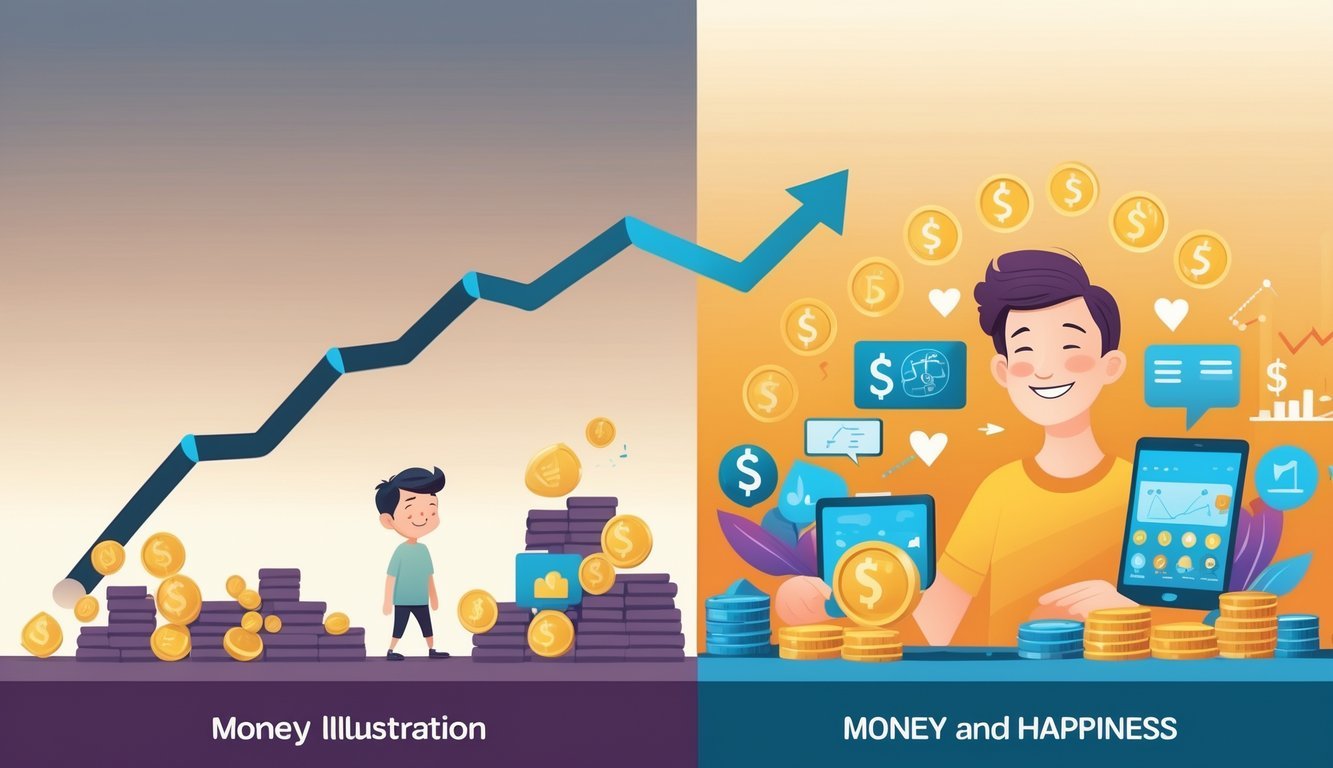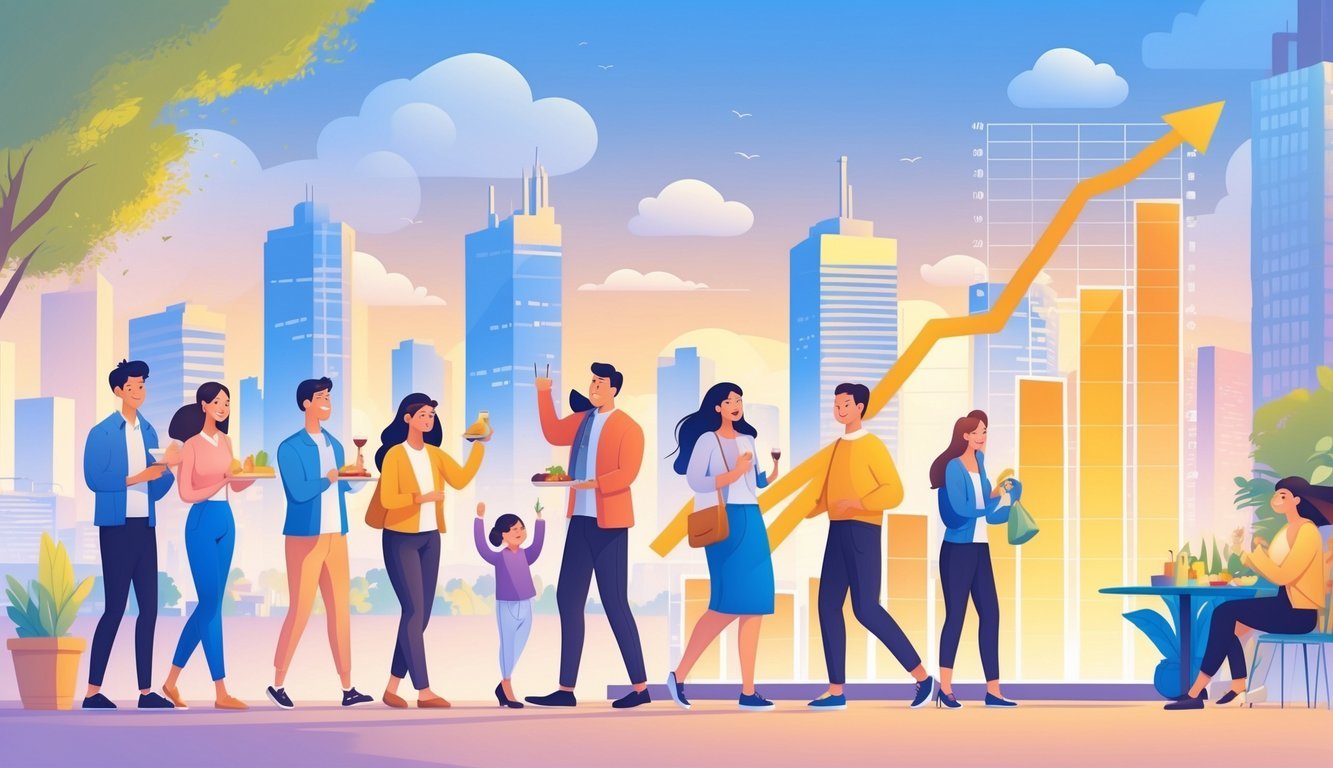PsychNewsDaily Publishers
100 Summit Drive
Burlington, MA, 01803
Telephone: (320) 349-2484
PsychNewsDaily Publishers
100 Summit Drive
Burlington, MA, 01803
Telephone: (320) 349-2484
Income increases happiness, especially when covering basic needs. Factors like security, education, and health care significantly influence the relationship between wealth and well-being.

You’ve probably heard the old saying that money can’t buy happiness. But is that still true? Lately, studies show that as your income climbs, so does your happiness—at least for most people.
Money seems to buy more happiness than it used to, since higher earnings now bring more comfort, security, and emotional well-being.
Of course, having more money won’t guarantee a perfect life. How much happiness you get from money depends on your income and how you spend it.
The more you can cover your basic needs and feel safe, the more your happiness grows with each extra dollar. It’s interesting how money’s role in happiness has shifted over time.
If you understand this change, you might make different choices about your finances. Maybe earning more matters more than you thought.

People’s views on money and happiness have changed a lot. If you look at how income affects well-being and what research says, you’ll see new patterns.
Back in the day, most folks thought money didn’t buy happiness. Many believed that once you covered your basics, more money didn’t make much difference.
Early research suggested that after reaching a certain income, extra cash barely moved the needle on happiness. Life was simpler, and people seemed to care more about family, community, and health than about money.
For most, income just meant survival, not joy. Funny how priorities shift.
Recent studies paint a different picture. Experts from places like Wharton and Princeton have found that as your income rises, you often feel happier and more secure.
When your income jumps from low to moderate, you really notice the difference. Some research says happiness keeps rising with income, while others claim it slows down after a certain point.
Still, most agree that higher income eases money stress and opens up more opportunities. That’s hard to argue with.
Today, income seems to matter more for happiness than it did before. With rising costs for housing, education, and healthcare, money helps you enjoy life’s experiences and comforts.
People compare themselves to others more now, so income differences feel sharper. That makes money feel even more important for life satisfaction.
| Income Level | Impact on Happiness |
|---|---|
| Low Income | Major increase in happiness with income rises |
| Moderate Income | Continued happiness growth, more opportunities |
| High Income | Smaller gains but still some positive effect |
When your income grows, you get more freedom, security, and choices. All of that can boost your happiness.

Money can make you happier, but a lot of other things play a part. Your basic needs, health care, education, and social changes all shape how much money matters. It’s not the same for everyone.
Covering basics like food, shelter, and safety really boosts happiness. Research suggests that making about $75,000 a year helps most people feel secure.
If you’re struggling to meet your needs, even a little more money can make a big difference. Once you’re comfortable, though, extra income adds less to your happiness.
That sense of security lays the groundwork for satisfaction.
Income inequality means some have way more money than others. When the gap widens, happiness levels drift apart too.
You might see wealthier folks enjoying better life satisfaction. Meanwhile, people with less money can feel left out or even resentful. The uneven spread of money makes happiness harder for some to reach.
Your social class shapes how much money helps your happiness. For the middle class, steady income brings stability and opportunity.
But the middle class faces rising housing costs and slow wage growth. Money’s become more important just to keep up and avoid financial stress.
The class divide shows that money’s impact isn’t equal for everyone.
Affordable health care and good housing make a huge difference in happiness. If you have health issues, more income means better treatment and less stress.
With housing costs rising, extra income often just covers rent or a mortgage. Without stable housing or health care, money can’t do much for your well-being.
Higher education usually leads to better jobs and more income. That often means higher happiness.
People with less education tend to report lower life satisfaction, partly because they earn less. If you have access to education, you’re more likely to afford health care, housing, and good experiences.
Universal basic income (UBI) and guaranteed income programs give regular payments to help people feel more secure. If you get this support, you might feel less stressed and happier, especially if money’s tight.
These ideas could help close the happiness gap from inequality. There’s still plenty of debate about costs and long-term effects, though.
The COVID-19 pandemic made money worries and mental health problems way more obvious. Losing a job or getting sick showed just how much income matters.
Mental health struggles and deaths of despair rose, especially where people felt stuck. Stable income and good health care became even more crucial for happiness.
Money and happiness keep popping up in politics. Politicians talk about economic policies and ways to reduce inequality because these things shape your daily life.
Public debates often center on how to help more people climb the economic ladder. You’ll hear plenty of arguments about whether money really buys happiness and who should get more support.
You’ve probably heard “money can’t buy happiness.” Lots of people still believe happiness comes from relationships, health, and meaning.
That’s true in many ways, but research shows money buys more happiness now than before—especially if it helps you meet your needs and stress less. Culture shapes how you see money, but the facts about income and happiness are hard to ignore.

Money can change your happiness in lots of ways. It helps with basics, but your mindset and culture matter too.
Some argue that money buys happiness by covering your needs and bringing security. Others say true happiness comes from relationships and experiences, not stuff you buy.
Research finds that as your income rises, your happiness usually climbs—at least up to a point. After that, extra money gives smaller boosts.
Psychologists say money helps you worry less about survival and gives you more freedom. But your values and expectations matter in how much joy money brings.
Once you hit a comfortable income, like $75,000 to $240,000 a year depending on the study, each extra dollar adds less to your happiness. It’s the law of diminishing returns in action.
Money can give you security and options that make life better. Still, meaningful relationships and personal growth usually matter most for real fulfillment.
In some cultures, people seem happier with less money, probably because community ties matter more to them. Others might link higher income directly to status or personal satisfaction.
Your culture really shapes how money affects your happiness. Isn’t it interesting how the same amount of money can mean something totally different depending on where you live?